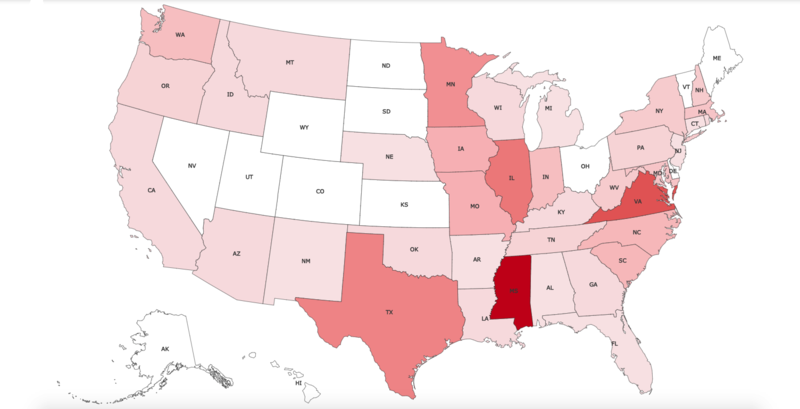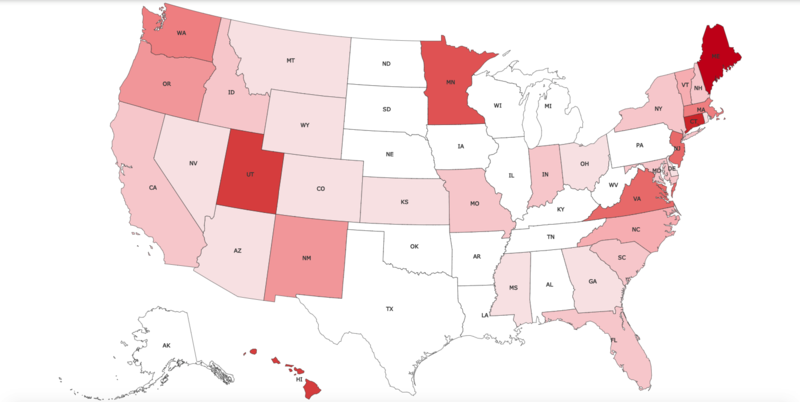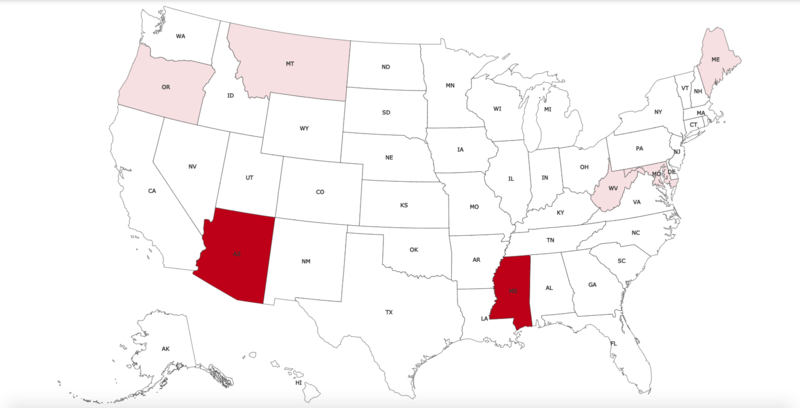The Ballot Bulletin: April 2019
Welcome to The Ballot Bulletin, where we track developments in election policy at the federal, state, and local levels. Each issue includes an in-depth feature—such as an interview or legislative analysis—and discussions of recent events relating to electoral and primary systems, redistricting, and voting provisions. In this month’s edition, we take a closer look at two partisan gerrymandering cases recently heard by the Supreme Court, and we ask five experts for their insights on the cases.
Have a question/feedback/or just want to say hello? Respond to this email, or drop me a line directly at Jerrick@Ballotpedia.org.
Redistricting roundtable: SCOTUS hears oral arguments in two partisan gerrymandering suits; what comes next?
On March 26, the Supreme Court of the United States heard oral arguments in two partisan gerrymandering suits, Rucho v. Common Cause and Lamone v. Benisek. During the course of arguments, the justices appeared divided over the issues central to both cases: are partisan gerrymandering claims justiciable under federal law, and should federal courts intervene to settle disputes over alleged partisan gerrymandering?
- What were the justices saying?
- Associate Justice Neil Gorsuch, appointed to the court by Pres. Donald Trump (R), asked Emmet Bondurant, counsel for Common Cause, the following: "What do we do as well about the – the fact that about 20 states, as I understand it, from – from your friend on the other side, have dealt with this problem through citizen initiatives as a remedy to deal with this, including, I think, five of them just this last election and a bunch more on the ballot in the coming election. Why should we wade into this – when that alternative exists?"
- Associate Justice Elena Kagan, a Barack Obama (D) appointee, disputed Gorsuch's claim: "I mean, going down that road would suggest that Justice Gorsuch's attempt to sort of say this is not so bad because the people can fix it is not so true because you're suggesting that the people really maybe can't fix it, you were wrong about the people being able to fix it, and if the people could fix it, while it's not the constitutionally prescribed way because it's never been done before, so Justice Gorsuch's attempts to save what's so dramatically wrong here, which is the Court leaving this all to professional politicians who have an interest in districting according to their own partisan interests, seems to fail."
- Associate Justice Brett Kavanaugh, a Trump appointee, echoed Gorsuch's inquiry: "But what about, to pick up on something Justice Gorsuch said earlier, that there is a fair amount of activity going on in the states on redistricting and attention in Congress and in state supreme courts? In other words, have we reached the moment, even though it would be a – have we really reached the moment, even though it would be a big lift for this Court to get involved, where the other actors can't do it?"
- Associate Justice Sonia Sotomayor, an Obama appointee, responded as follows to the point made by Paul Clement, counsel for Rucho, that partisan gerrymandering claims are not justiciable under federal law: "Once we decided the one person, one vote concept, we've been pretty much in all of our jurisprudence saying that certain acts by the legislature are unconstitutional, including race discrimination and others. It can't be that simply because the Constitution says that a particular act is in the hands of one – one branch of government, that that deprives the courts of reviewing whether that action is constitutional or not."
- The high court is expected to rule on both cases prior to the conclusion of the current term in June of this year.
- Ballotpedia spoke with five election policy experts, from different sides of the debate, to get their takes on how the court might rule in these cases and what the ramifications of these rulings might be.
- Logan Churchwell (Communications and Research Director of the Public Interest Legal Foundation): "The court was right to find in 1986 that 'no group right to an equal share of political power was ever intended by the framers of the Fourteenth Amendment.' The framers of the Fourteenth Amendment did not set out to provide a cause of action to address 'political gerrymandering,' since they personally benefited from more extensive 'gerrymandered' maps before they crafted the Fourteenth Amendment. North Carolina's maps are considered highly suspect in Common Cause v. Rucho based on Republicans taking 10 of 13 House seats in 2014 and 2016, despite 'exceedingly close' results in statewide races. Elections for the 39th Congress [which approved the Fourteenth Amendment] make these figures look tame, by comparison."
- California: 3 Republicans / 0 Democrats (58.6 percent of popular vote to GOP)
- Connecticut: 4R / 0D (51.4 percent of popular vote to GOP)
- Maine: 5R / 0D (59.2 percent of popular vote to GOP)
- Michigan: 6R / 0D (55.3 percent of popular vote to GOP)
- Minnesota: 2R / 0D (59 percent of popular vote to GOP)
- New Hampshire: 3R / 0D (52.6 percent of popular vote to GOP)
- "State powers governing means of elections and qualifications therein help prop up the federalist balance of power. Allowing the federal judiciary into purely political squabbles will upset that balance. Federal interests, for generations, have not feared that states would choke out Congress by refusing to perform elections. States should maintain their powers here, and the Supreme Court should reverse the prior decision."
- Logan Churchwell is Communications and Research Director of the Public Interest Legal Foundation, which is a law firm that "exists to assist states and others to aid in the cause of election integrity and fight against lawlessness in American elections."
- Edward Foley (Ebersold Chair in Constitutional Law at the Moritz College of Law at The Ohio State University): "Based on the oral arguments in these two cases, I predict that Justices Alito and Kagan will write very strong opinions on the opposite sides on the issue: Justice Alito writing to explain why Paul Clement is correct to argue that the issue is non-justiciable even though a law that on its face discriminated against a political party when drawing district lines would violate the First Amendment, with Justice Kagan writing why in the absence of facial discrimination a redistricting map violates the First Amendment if the statistical evidence shows it to be an extreme form of viewpoint discrimination against a political party and that this statistical evidence permits judicial identification of the First Amendment violation (and thus it is a justiciable issue). How the court decides the cases depends, I think, on whether Chief Justice Roberts and Justice Kavanaugh find Justice Alito’s or Justice Kagan’s opinion more persuasive. In other words, even if there has now been a tentative vote one way or other, this issue is one where the outcome is not final until the opinions have been written. So, which way will the Chief and Justice Kavanaugh go? I think that’s very hard to predict based on the arguments. If one has to guess, I’d guess in favor of Justice Alito’s direction, but it really must be a tentative guess. Either way, the ruling will be major, but still will not settle everything. Even if Justice Alito purports to shut the door, there are other theories not presented in these cases that might return to the court after 2020. And even if Justice Kagan’s view prevails, it will not end all gerrymandering, but only the most extreme versions, and there will need to be activity at the state level – either independent commissions or state-court litigation – in an effort to purge redistricting from pernicious partisanship."
- Edward Foley is the Ebersold Chair in Constitutional Law at the Moritz College of Law at The Ohio State University. His book Ballot Ballots: The History of Disputed Elections in the United States was awarded Finalist for the 2016 David J. Langum, Sr. Prize in American Legal History.
- Walter Olson (Walter Olson is a Senior Fellow at the Cato Institute): "Repeatedly in recent terms Justice Elena Kagan has kept hope alive for the liberal wing by proposing narrow centrist rulings to avert sweeping conservative wins. Oral arguments March 26 hinted at what she might have up her sleeve this time. One factor working in her favor is that under the line of cases culminating in Davis v. Bandemer (1986), at least some extreme partisan gerrymandering still does count as unconstitutional under sound court precedent – even if Vieth v. Jubelirer (2004) whittled that precedent down in practice to something with not much more practical substance than a hologram. At oral argument Kagan suggested one way forward that might tempt Kavanaugh or Roberts: approve liability in that small number of disputes in which the record documents improper motivation essentially beyond reasonable dispute, as in the Maryland case. As Justice Breyer noted when it came up last year, the court may never again see a record as damning as that in Maryland, because future drafters of gerrymanders will know better than to go on the record with such indiscretions. So no floodgates, right? Rather than hundreds of cases, there will be at most a few arising after political insiders got extra careless about what they wrote down. That is, at least until cases come in proposing to infer improper motivation from the combination of more ambiguous utterances with extremely bad facts. But that issue could be left unresolved to fight another day."
- Walter Olson is a Senior Fellow at the Cato Institute, a public policy research organization "dedicated to the principles of individual liberty, limited government, free markets and peace." Olson was the Co-Chair of Gov. Larry Hogan's Maryland Redistricting Reform Commission.
- David O'Brien (David O'Brien is a Staff Attorney at FairVote): "There’s a striking difference in expectations between this term’s gerrymandering cases and last term’s Gill v. Whitford. Yes, the departure of Justice Kennedy led many to despair that this court would ever take action against partisan gerrymandering, but the particulars of the new cases speak to the diminished prospects of definitive judicial intervention, even if the court decides such cases are justiciable. Post-Gill, plaintiffs must bring challenges against specific districts rather than an entire map (indeed, the Maryland case challenges only a single district). In both the Maryland and North Carolina cases before the court, there is evidence on record that those involved in the redistricting process openly admitted their goal was to give their own party an unfair advantage. This may make a compelling case that the challenged maps are partisan gerrymanders, but it also allows the court to craft a narrow ruling that would affect only gerrymanders drawn by the sloppiest, most indiscreet legislatures. This is where we are one year later: not anticipating a deathblow to partisan gerrymanders, but hoping for a limited, easily circumvented ruling as the best case scenario. What can we do? There is an ongoing effort to address the issue at the state level, either through state court litigation or the adoption of independent redistricting commissions, but this is subject to the specificities of state law and politics (and could be further hampered if the court decides to revisit Arizona State Legislature v. Arizona Independent Redistricting Commission). Many states lack the mechanisms citizens need to pursue these reforms, leaving millions of Americans stuck in unfair, uncompetitive, and unrepresentative districts. The real solution remains this: we join the majority of the democratic world in adopting a system of proportional representation. If the court won’t stop our elected officials from partisan gerrymandering, we must adopt a system that isn’t so uniquely vulnerable to gerrymanders. A system like the one proposed in the Fair Representation Act would be the perfect place to start."
- David O'Brien is a Staff Attorney at FairVote, a nonprofit organization whose mission is to advocate for "electoral reforms that give voters greater choice, a stronger voice, and a representative democracy that works for all Americans."
- Peter Schuck (Peter Schuck is the Simeon E. Baldwin Professor Emeritus of Law at Yale Law School): "I predict that the Supreme Court will reject both challenges to the partisan gerrymanders before the court in Rucho and Benisek. The standing and constitutional arguments of the challengers have much justification: the political speech and equal protection claims of both sets of challengers are normatively sound and consistent with court precedents in many contexts other than partisan gerrymandering. Moreover, the clear intent of these gerrymanders is to reduce the efficacy of voters' ballot choices. They do so regardless of how one defines vote efficacy (except in the most formalistic sense), and for no reason other than voters' partisan affiliations."
- "A majority of the court, however, is likely to be persuaded by a combination of factors – the history of controverted partisan gerrymanders long preceding the adoption of the Constitution; the fact that a growing number of state legislatures are abolishing or seriously constraining the practice and that this trend seems likely to continue; and the further constraint on it provided by state governments in which partisan control of the chambers and the governorship is divided between the parties and sharply contested in each election cycle. But the most important factor why I believe that the court will stay its hand, and the main reason it will give for doing so, is a lack of justiciability owing to the absence of both (1) any agreed-upon definition of 'excessive' as applied to partisan gerrymanders; and (2) any workable test for excessiveness other than vote-seat efficiency. This efficiency test, as I previously pointed out on this site, suffers from several difficulties. One is that the court is now more sharply divided ideologically than at perhaps at any time since the court-packing crisis of the late 1930s, and another is that the public's approval rating of the court has declined along with that of Congress and the Presidency (although less sharply than the other two institutions have). The court majority, led by a chief justice who is keenly aware of both of these difficulties, will resist any test of partisan excessiveness whose application by the justices in particular disputes will plausibly seem arbitrary and partisan. And it can gild its nonpartisan lily by refusing to adjudicate flagrant gerrymanders by both of the parties."
- Peter Schuck is the Simeon E. Baldwin Professor Emeritus of Law at Yale Law School. HIs most recent book, One Nation Undecided: Clear Thinking About Five Hard Issues That Divide Us, was published in 2017 by the Princeton University Press.
- Logan Churchwell (Communications and Research Director of the Public Interest Legal Foundation): "The court was right to find in 1986 that 'no group right to an equal share of political power was ever intended by the framers of the Fourteenth Amendment.' The framers of the Fourteenth Amendment did not set out to provide a cause of action to address 'political gerrymandering,' since they personally benefited from more extensive 'gerrymandered' maps before they crafted the Fourteenth Amendment. North Carolina's maps are considered highly suspect in Common Cause v. Rucho based on Republicans taking 10 of 13 House seats in 2014 and 2016, despite 'exceedingly close' results in statewide races. Elections for the 39th Congress [which approved the Fourteenth Amendment] make these figures look tame, by comparison."
Legislation update: Redistricting, electoral systems, and primary systems bills
The maps below identify states in which redistricting, electoral systems, and primary systems bills are being considered in 2019. A darker shade of red indicates a greater number of relevant bills.
See also
- Election policy on Ballotpedia
- Electoral systems legislation at the state and city levels in the United States, 2019
- Primary systems legislation at the state and city levels in the United States, 2019
- Redistricting legislation at the state and city levels in the United States, 2019
| |||||||||||||||||||||||







